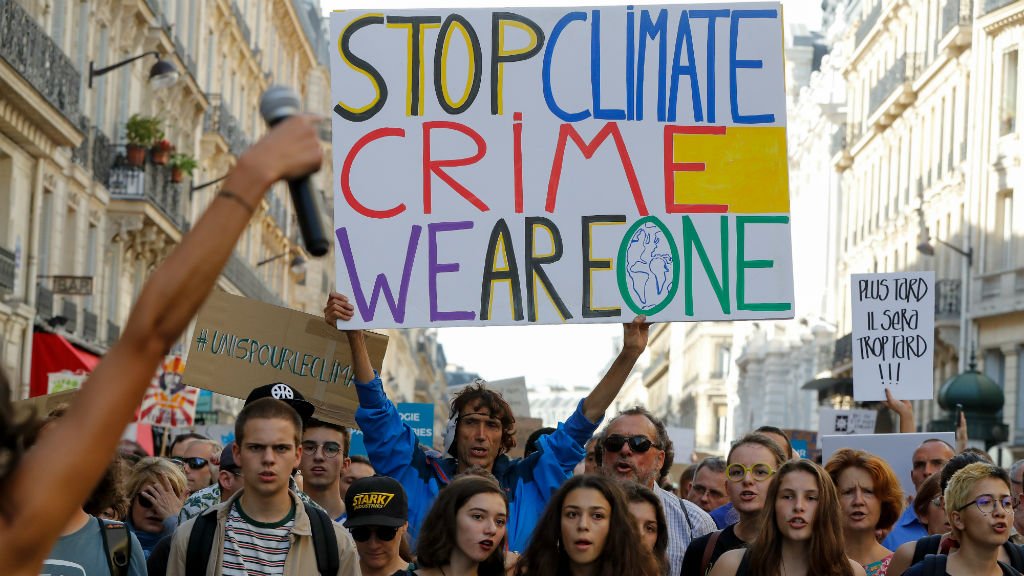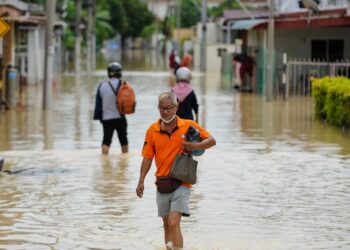The worldwide climate strikes planned for September 20 are a powerful reminder of the speed with which the world can change. They also highlight yet again the urgency and difficulty of translating global climate protests into global climate action as well as the abiding importance of collective action in dark times.
Would you have believed me if I’d told you, just 12 months ago, about the speed with which the Student Climate Strike, Climate Emergency, and Extinction Rebellion movements would grow?
On August 20 last year, the then 15-year-old Swedish student Greta Thunberg began her strike outside the Swedish Parliament. Within a year, her fierce commitment to speak truth to power has become a lightning rod for global climate action, inspiring millions of young activists in over 150 countries.
Before I started school striking I had no energy, no friends and I didn’t speak to anyone. I just sat alone at home, with an eating disorder.
All of that is gone now, since I have found a meaning, in a world that sometimes seems shallow and meaningless to so many people.— Greta Thunberg (@GretaThunberg) August 31, 2019
Extinction Rebellion, officially launched in London in October 2018, has triggered wave on wave of non-violent civil disobedience in support of their demand that “government must tell the truth by declaring a climate and ecological emergency.” In the last 12 months, over 900 national and local governments – from Ireland to Argentina and from New York to Sydney – have indeed declared such an emergency.
The problem, of course, is that over the same period every month brings news of yet another global temperature record broken and yet another sign of the speed with which trust in democratic institutions and processes is being stripped away by authoritarian, nationalist, and populist forces.
The school climate strikers and Extinction Rebellion activists are entirely correct in demanding that we face the harsh reality of the climate crisis with our eyes wide open. With wildfires raging from the Amazon to Siberia, there is no escaping the stark consequences of Thunberg’s sharp and timely warning: “I want you to act as if the house is on fire. Because it is.”
But with the livelihoods of millions of climate refugees and climate change ravaged communities becoming ever more precarious and the authoritarian xenophobia of politicians like Donald J. Trump, Jair Bolsonaro, and Boris Johnson becoming ever more dangerous, there is a second tough and urgent challenge.
Turning Protest into Action
To address the escalating risks of an increasingly unequal and undemocratic world in which racist violence and Amazonian firestorms are ignited and fueled by rich and powerful bandits artfully disguised as politicians, we need to rapidly strengthen our capacity to translate climate emergency protests into decisive, game-changing climate action.
Deepening understanding of the existential threat which the climate crisis poses for the health and wellbeing of human beings and other species is a crucial first step as is an even sharper focus on climate justice for indigenous peoples and communities most vulnerable to drought, fire, and flood.
It is increasingly vital, however, that we combine this understanding with strategies capable of countering the cunning skill with which political operators like Steve Bannon and Nigel Farage manipulate anxiety and fear about asylum seekers and climate refugees to strengthen support for the cynical and brutal politics of racial division, detention, and deportation.
Green New Deal Demands and Alliances
Second, we clearly need demonstrations so large, alliances so strong, and non-violent civil disobedience so disruptive that no government can ignore demands for emergency speed climate action. These actions will be even more effective when underpinned by recognition of the huge potential of a Green New Deal zero-carbon economy that creates high-quality jobs and socially just societies.
One crucial question here is whether public sector agencies gutted and scarred by decades of austerity and privatization still have the capability to design and implement large scale de-carbonization policies successfully.
Legal and Financial Action
A third priority is to rapidly expand the scale of legal actions requiring fossil fuel companies, investors, and governments to reveal and reduce their climate risk exposure and to further intensify shareholder action and reinvestment strategies designed to shift trillions of dollars from fossil fuels to renewable energy.

These strategies need to be deployed with a careful eye on the swirling mists of corporate greenwash and on building the strategic alliances necessary to ensure that spectacular legal and boardroom victories really do drive long term, scalable de-carbonization policies and investments.
Changing the Way We Live, Work, and Consume
Redesigning our cities, our institutions, and our ways of life to drive down consumption and build more healthy, just, and inclusive communities is a fourth key task.
Walking away from the troll driven rage of mainstream public politics for the quieter, more personally rewarding pathways of the community garden and the sharing economy should however best be seen as a way of complementing, not avoiding the collective action required to overcome the formidable power of fossil fuel vested interests and racist populism.
Remembering Magnificence
Joining and supporting the global climate strikes and protests on September 20 is clearly a crucial next step in demonstrating overwhelming public support for emergency speed climate action.
Awareness of the likelihood that even the most rapid and decisive action to decarbonize the global economy will still be insufficient to prevent severe and irreversible social and ecological impacts is also a source of deep distress for many individuals passionately committed to decisive climate action.

Even (or perhaps especially) in the age of Facebook and Instagram, the old-fashioned values of solidarity and reciprocity physically embodied in the collective action of walking together, shoulder to shoulder with thousands of others, remain a potent source of radical hope and defiant courage.
So too, as historian Howard Zinn reminds us, does the memory that “human history is a history not only of cruelty, but also of compassion, sacrifice, courage, kindness. If we remember those times and places–and there are so many – where people have behaved magnificently, this gives us the energy to act, and at least the possibility of sending this spinning top of a world in a different direction.”
Disclaimer: The views and opinions expressed here are those of the author and do not necessarily reflect the editorial position of The Globe Post.






















